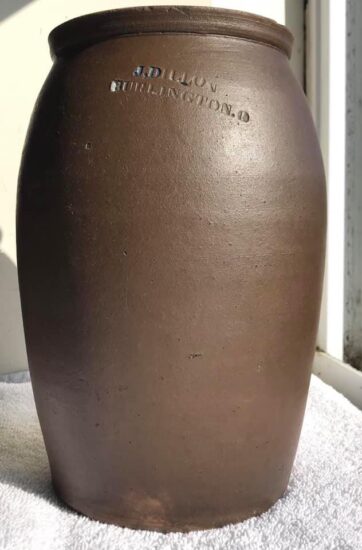AN OLD-TIME TALE
Ironton Register July 17, 1873
At Burlington, Ohio, forty years ago lived an old man named Moss, who pursued the manufacture of stoneware for the scanty livelihood. He was not a man of lofty aspirations but was content to live lazily, allowing nothing to trouble him to save such little vexations as the cows in the pasture are heir to.
One day, in Summer, Moss sat alone on a log on the bank of the river, languidly beating away the flies that would light on his ancient nose. It was hard work for him, but he put his time into it.
While thus engaged, a small covered flatboat that Moss had been watching for some time, floating from afar off, gently glided to the shore of the river, in front of where our hero sat, fighting the flies with the measured beat and slow. A neatly dressed man stepped from the boat and clambered up the bank.
This newcomer was a stranger who hailed from the waters of the Monongahela, and traffic was the object of his visit. In a manufacturing town where he resided, a company had brought a tremendous stock of hats from the mountains, and though they tried every means, the employees wouldn’t purchase them.
The hats were tall, with long fur, and magnificent in their ugliness. For weeks the hats remained on hand, and not a workman would buy a hat. The company began to see that their purchase was dead stock, so they shipped them, thinking that when twenty miles below Pittsburg, they would find the people green enough to buy those hats.
Down the river sailed the hat-ladened craft – Wheeling, Marietta, Pomeroy, Gallipolis, and all the little intermediate burgs were visited. Everywhere, the commodore of the hat fleet tried hard to dispose of his merchandise, but in vain.
And now we take him where we left him, climbing the river bank at Burlington, Ohio, and dubiously approaching Moss, who sat perfectly indifferent to all the world except the flies that tickled his nose.
Moss wore an old chip hat [A cheap kind of hat made of strips of the leaves of a Cuban palm tree], half whose brim had parted company with the crown and resting romantically on his shoulder. The stranger thought, here is the chance to sell a hat, and, stepping up to Moss, saluted him with the intelligence that the day was hot.
Moss only slapped a fly in recognition of the civil approach and never even looked up. After many feints, which elicited no engagement, the stranger asked Moss if he did not want to purchase a fine hat. The latter replied he didn’t care if the former would take it out in trade. “What kind of trade,” quoth the stranger, “Crockery ware,” replied Moss.
Then there was much conversation, chiefly on the stranger’s part, in which he found out that he could exchange the stone war at Ripley for 8 cents cash or 8 cents trade.
The stranger asked Moss down to see the hats and down-waddled Moss to the boat. The stranger was eloquent in praise of his merchandise, asked an overwhelming price, agreed to trade for stoneware at 8 cents a gallon, and then asked Moss how many hats he would take. “All,” said Moss.

The stranger was highly delighted and pushed the exchange with alacrity. – Moss showed him the pile of stoneware, told him where to put the hats, went home, and went to bed for a good long, summer day nap. The stranger hurried out with the hats and loaded the boat with stoneware, at sundry intervals, going to Moss and inviting him over to see that things were done on the square.
Moss would only yawn at these frequent invitations, roll over and go to sleep again. Finally, the stranger got the exchange completed, putting in a few dozen gallons more than he was entitled to, only to teach Moss a lesson, and pushed his craft into the river, trembling all the time, lest Moss or the Sheriff or all Burlington would come down and put an end to his imposition. He was much pleased when he passed where the Lawrence county line struck the river and in full sail for Ripley.
When he reached the latter place, he went to town to a dealer and asked if any stoneware was wanted. – The dealer replied in the affirmative, and a bargain was struck at 8 cents cash. The stranger was full of joy and anticipated the gleeful times he would have in rehearsing the events of his voyage and particularly how he took in old Moss at Burlington, Ohio.
The dealer and our friend, the stranger, went down to the boat to examine the stoneware. The dealer took up a jug and thumped hard with his finger: “There is a flaw in this,” said the dealer. “Throw it in the river,” said the hat man. The dealer took up a pan, thumped it, and said it was bad. “Throw it in the river,” said the hat man.
The dealer handled other ware with the same verdict and command from the hat man, who added, “Take only what’s good – I don’t want to sell a gallon of badware.” But the dealer found a good one, although he examined piece after piece and kept throwing the cracked, imperfect ware into the river until it was all gone. Who wants to buy a boat? Said the hat man.
A purchaser was found at $7.50, and the hat man left Ripley for the banks of the Monongahela to tell the story of his grief to his old comrades and to warn them against trying to find greenhorns down in Lawrence county.
Moss had traded the stranger a few cords of damaged stoneware that he had piled up near his pottery because he was too lazy to throw it over the river bank.
So the captain tells us the story.

0 Comments